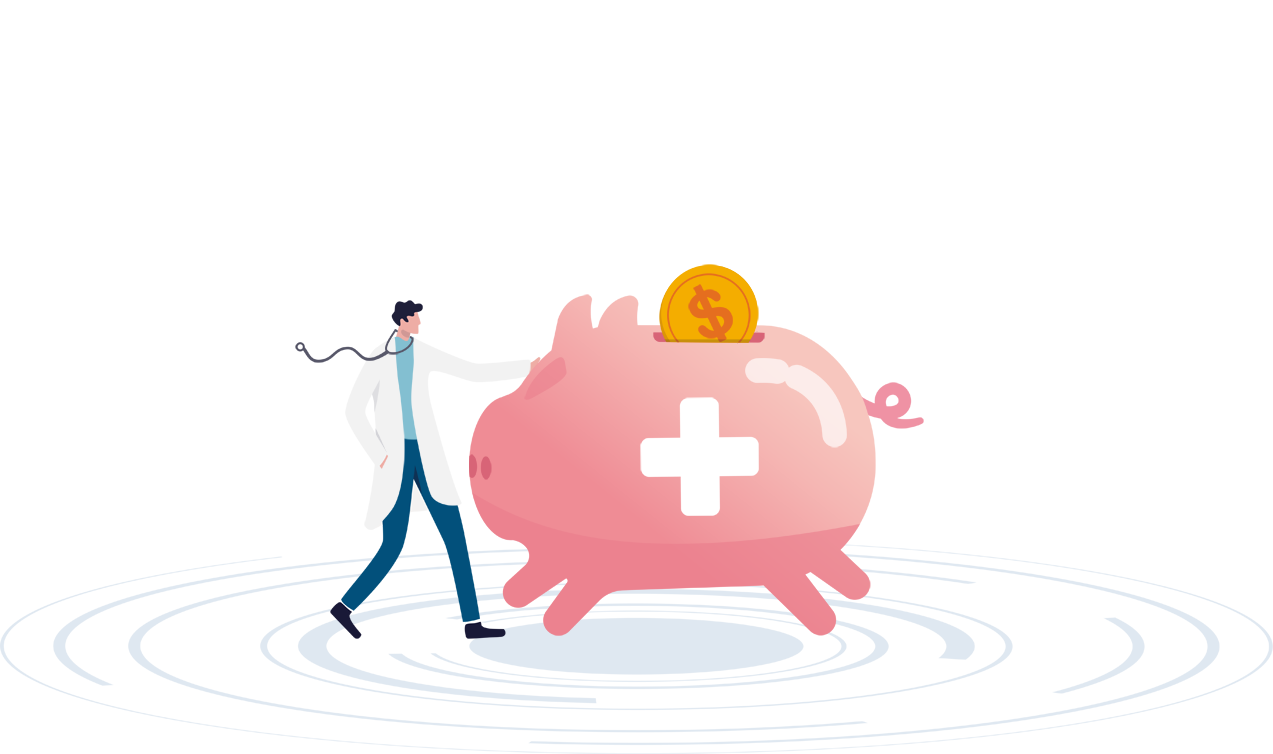Financial Health Check
![]()
A tool to access Income – Expenses, Cash Flow, Asset – Liabilities and needs – aspiration

As the name suggests, it is an assessment of your personal finances. Financial health checkup is based on various parameters of personal finance and involves scrutinizing of income, expenses, savings, goals, assets, liabilities etc.
A financial health check is a preliminary step in the financial planning process. Getting a financial health checkup is a great way of staying updated on your personal finance and preventing scams from happening. This provides an easy idea whether your finances are aligned with your goals or if there’s a need or scope for some improvement. Basically, a financial health checkup identifies the gaps in your finances and outlines steps to fill those gaps.
The common misconception is that a financial health checkup, is a one-time activity. However, a detailed financial health checkup is required on a regular basis, just like our regular health checkups, since our income, standard of living, and goals keep changing. Periodic evaluation of your personal finances will help you to determine your current asset or debt standing and in turn, help you to come up with strategies with respect to savings and investment decisions.
We often ignore taking this exercise not realizing the importance of financial checkup and its impact in the long run. The periodic diagnosis of your finances and wealth will not only help in analyzing your financial problems but also help you to determine ways to solve them.
A financial health check-up is a critical aspect of financial planning and comprises of analyzing all the elements that make up your financial health. This process is an effective way to assess the position of your financial health in relation to your goals, needs and aspirations. In addition, it helps review your retirement health and security for the future. Often, investors estimate their investments in a different way from the reality leading to problems in the future. An expert financial health check-up can help maintain clear finances as well as create a suitable financial plan.
A financial health check is required for investors to be accurately aware of their financial position and be prepared for any contingency that may arise. The check-up looks at one’s earnings and investments in accordance with their age, marital status and employment prospects for a detailed outlook. Some of the benefits of a financial health check-up include:
- A detailed review of income and expenses
- Insights to control debt and boost savings
- Identifying and remedying sources of unnecessary expenditure
- Identifying the right investments as per your financial goals
- Expert advice on insurance and mutual fund investments
- Effective tax planning for added savings
A financial health check-up looks at one’s overall financial picture and identifies the best ways to improve on it for a better future.
Here are some other benefits of conducting periodic financial health checkups
1) Smart and proactive move which provides you with a standing of your personal finance.
2) Provides a roadmap to your finances, in which direction you should move.
3) Helps in finding the missing piece of jigsaw puzzle i.e. guides on how you can achieve your goals.
4) Helps you to take action at the right time i.e. when the situation changes. For example, if your investments are not performing as expected, you have the knowledge and the option to postpone your discretionary goal.
5) Covers assessment of not just investments but also protection products like life, health and critical illness insurance.
Conducting a financial health checkup from time to time gives you the peace of mind when everything is going according to your plans. On the flip side, a timely financial health checkup will alert you when things are going south and will give you sufficient time to enforce corrective measures.
People often procrastinate and postpone the act of taking control of their finances. They may be occupied with other things or may not know where and how to start. However, dedicating some time to this activity can be far more beneficial in the long run. So, get your finances health- checked today!
Most people are unaware of certain basic things or factors to look out for, which are basically warnings towards incoming financial peril. If ignored, these may prove to be very costly, but if identified at an early stage, they may be corrected to ensure sound financial health and leads the way to efficient and effective financial planning. Let’s see the top 7 signs indicating the need for financial health checkup:
Financial Health Checkup tries to access following areas:
Liquidity checks for emergency situations
Imagine a situation where you suddenly face job cut or meet with an accident which will disrupt your income earning capabilities. Many people are experiencing job loss or pay cut currently owing to COVID-19. You can’t predict such unpredictable events or developments. You can check your liquidity position by calculating the liquidity ratio as below.
Cash or most liquid assets (include fixed deposits, Mutual Fund units and equity or ETFs) ÷ Regular household expenses incurred or estimated per month
This ratio will give out the time period for which you have surplus funds on which you can sustain without any income during such period. This is the additional liquid funds which are actually your emergency buffer, which should ideally be not less than 3. If you have liquidity ratio of 1-1.5, then there lie times of trouble ahead.
Also, if you have equity investments done specifically for a goal like children education or tag to any other goal then do not count that amount in this calculation as you should not ideally consider this for meeting emergencies.
Loans without reciprocal asset creation: Debt Ratio
Credit card loans or EMIs for luxury (simply put unnecessary items) are just an example of unwarranted loans, which do not lead to any asset creation in the long run. So, forget about that high end smartphone which will put a hole in your pocket (almost equaling a month’s grocery) and put your finances to use. You can assess your debt position with following ratio.
Total assets ÷ Total liabilities (loans)
Loans would include long term and short-term loans like credit card loans etc. Ideally a person in the age group of 25- 45 years, has higher ratio due to higher long-term loans leading to long term asset creation.
Check the savings ratio
Financial planning starts and ends with savings. Savings should ideally be any amount saved, invested or any surplus earned. Any person would be better off with higher savings ratio which can be calculated as below.
Surplus generated or disposable income ÷ Income for every month
If you are encountering ratio below 1, then this is warning sign. It indicates that you are not saving, rather you are spending more. Even ratio more than 2 also indicates that you are borrowing and saving that money (works out only if interest payable is lesser than the interest income on the investment).
Assess where you stand
If you are the person who has a huge debt burden and is responsible for paying up a fixed amount as loan repayment, should assess your liquidity and solvency position. This can be calculated as below.
Monthly predetermined long term and short-term debt repayment commitments ÷ Income earned per month
You need not worry if your ratio is less than 1, rather it indicates effective debt management. However, those of you having ratio of more than 1, have to take a corrective action, as this ratio implies that you have borrowed way over the extent to which you can actually afford to pay off the liability.
Retirement planning
Those of you, who have started retirement planning, may well be ahead of all others, may be able to enjoy the power of compounding. This will not only enhance the retirement corpus for you, but will also ensure that you will achieve it within your time frame, even where your cost of investment is much lower due to early entry as compared to others.
Amount contributed towards retirement planning ÷ Total income earned
Ratio of 5-7% indicates that you are contributing to satisfy threshold for tax saving instruments only, while ratio of more than 10% indicates that you are aiming at building up the retirement corpus for early retirement. However, any ratio below 5% would need reconsideration of financial planning, which would maximize the retirement contribution to optimal levels.
Impulse purchases or exceptional spending behavior
Why is that, every time you go to a mall, you need to buy a dress which will make you regret afterwards (in terms of cost of course!)? Why is that you can’t resist ordering pizza often which is almost equal to two weeks of grocery payment? These are sheer impulse or unnecessary items, which you buy out of sheer laziness or in the heat of the moment.
Impulse / exceptional purchases ÷ Income earned per month
If you are below 5%, then no reason to worry, because your finances can still handle it (but you will need to prevent such impulse shopping). However, those of you landing in double digit ratio, are in deep trouble. This indicates that impulse purchases have rather become your habit and you are giving in to the temptations, which will land you in a situation, where you won’t have enough to pay for the things you need, because you have already spent on things you don’t need.
Well not you, but your financial assets and investments! Ideally, positive ratio would bring out the extra-ordinary situation, which proves that your net worth is increasing and you will be achieving your financial goals well before the time frame.
Net worth ÷ Total assets
Where net worth = total assets (includes short term and long-term assets) – total liabilities (both short term and long term). So, this net worth may keep on changing every month, depending upon the commitments. However, if you find out that this ratio is consistently negative for more than 1-2 months, then it’s a warning bell which will suggest that, you have borrowed way more than you can afford to pay off later.
Financial planning is a discretionary and yet quite typical procedure, which is ongoing and needs to consider holistic approach. Above seven indicators will give you outline that it is not just about the saving or about investment. However, you need to evaluate, analyze and put up any corrective and preventive measures, for any aspect of the financial planning.
Scheduling regular body health check-ups has become a widely accepted norm these days. However, this wonderful habit should also apply in fiscal matters. A routine check of one’s financial status is as important as a health check-up. Evaluating your personal finances informs you of current debts and assets and helps you devise strategies and take appropriate investment decisions.
The Bottom Line
The reasons above emphasize on the importance of conducting a financial status check from time to time. Proper financial planning only leads towards better health and a brighter future.



